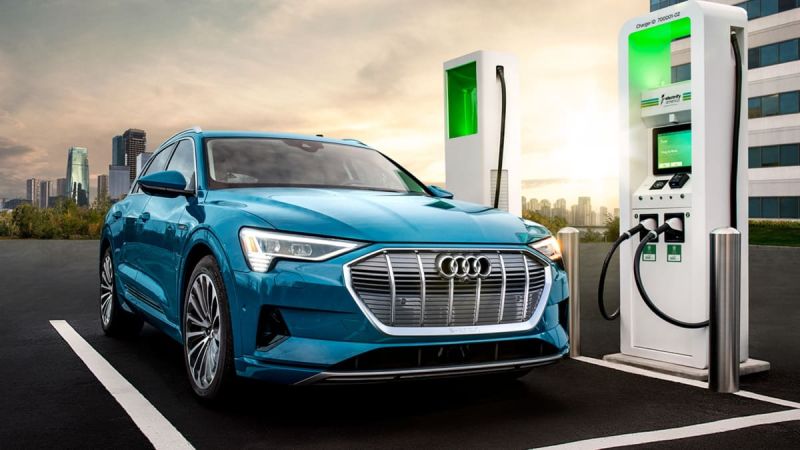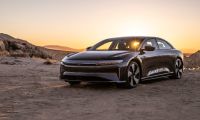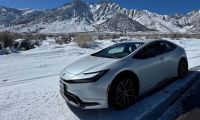For all its woes with Dieselgate and the challenges of a changing automotive sector, Volkswagen Group (VW) has not crawled under a rock to lick its wounds and hide from the fallout. After receiving a fine of $25 billion from the US government in 2016, VW has moved quickly to accept its punishment, acknowledge its mistakes, and regroup for a more squeaky clean future.
Whether or not we believe them seems moot at this point. The company is paying its penance, in North America at least, and is putting a lot of emphasis on electrification.
If VW succeeds in its stated objectives, Tesla will finally have a forward-thinking and established competitor in the all-electric sector it now dominates. If the German automaker fails, it will sink further still in consumer opinion and could struggle to retain market share as customers move to electric models.
3 Signs That VW Could Become the (non-Tesla) EV Leader
With that in mind, here are three aspects of VW’s approach to electrification that could see the more optimistic of those two scenarios play out over the next couple of years.
1. Already Advertising (in a Thoughtful Way)
One of the great criticisms of General Motors, a company that has already released two groundbreaking EVs and triggered the federal tax credit phase-out along with Tesla, is that it fails to effectively advertise electric vehicles.
Mainstream ads for the Chevy Bolt EV are rare and only a small proportion of dealerships are actively selling the car, in much the same way the prematurely retired Chevy Volt plug-in hybrid was regarded as an ugly stepchild of its gasoline-only brethren.
On the subject of those cars, here's how the Chevy Volt impacted sales of the Chevy Bolt EV.
Although it’s still early days for VW in the realm of electric vehicles, ads for the company’s EV plans have been everywhere this year. Perhaps I’m in my EV bubble seeing VW's "Drive Bigger" ads on social media and news sites, but when the company’s apology clip featuring the VW ID. Buzz is all over the Women’s World Cup tournament and ads for the Audi e-tron show up at the Super Bowl, you know that it's an attempt to reach the masses.
Add to this the fact that VW’s settlement also mandates the funding of Electrify America, a supposedly brand-agnostic organization tasked with expanding the U.S. charging infrastructure and raising awareness about electric vehicles, and you have a lot of money invested in EVs.
None of this guarantees that VW’s electric masterplan will come to pass, but it certainly seems to indicate more than an attempt to greenwash the company’s reputation and keep selling combustion engine vehicles.
Take a look at the top 10 best-selling EVs so far for 2019 in this video. (Please subscribe to Torque News YouTube Channel for daily automotive news and analysis).
2. Clearly Defined Brand Lines
For all the news about accelerated electrification plans coming out of major automakers like Toyota and BMW in recent months, it doesn’t feel like any of the major brands have a well-defined line of electric vehicles ready to roll. The general intent is pointing in the direction of electric vehicles, but model names and numbers seem to be vague, at best.
Not so for VW, which has its ID line branded and targeted at specific markets based on consumer preferences. The Volkswagen ID. 3, for example, is already taking preorders in Europe, where smaller hatchbacks are popular and the company is aiming for 30,000 orders on its initial production run.
We have no such specific details for the Volkswagen ID. Crozz, which will be the first VW EV to grace the North American market, but we know it will slot into the larger CUV/SUV styling that the market prefers and begin production in 2020. VW has also confirmed that the Crozz will eventually be built in Chattanooga, TN, firming up plans to serve the EV market and start bringing costs down over the next few years.
Such specific details give more confidence that VW is planning to follow through on the more general positive sentiment that it currently demonstrates for electric vehicles.
3. The Expansion of Electrify America
As mentioned earlier in this article, Electrify America is an organization moving rapidly to develop the U.S. charging infrastructure and boost education about electric vehicles. A similar, smaller project is underway north of the border with Electrify Canada.
Granted, this effort is court-mandated, but it still gives VW another angle with which to sell its upcoming EVs. Owners of the 2019 Audi e-tron, for example, receive 1,000 kWh of free charging on Electrify America fast-charging stations over their first four years with the car. It’s no great stretch to imagine that other Volkswagen group brands, including the ID. line, will launch with similar fast charge incentives.
On the same subject, here's a charging issue on Electrify America that is impacting Hyundai Kona Electric and Kia Niro EV owners.
It should raise eyebrows, however, that much of this is promotional value is accomplished by stealth. The Electrify America network is intended to be brand agnostic. More and more, that appears to be truer in word than it is by deed.
Decisions such as offering only a solitary CHAdeMO plug at its current locations, while providing at least 5 of the CCS plugs that VW electric vehicles will use certainly raised eyebrows in the Nissan Leaf EV community.
Taken alongside the coincidence of a new app and pricing aligning with the first deliveries of the Audi e-tron, the actions tell a different story and seem to give VW a healthy charging network to offer new customers and partially offset some the advantage Tesla has built with its Supercharger network.
It could be the case that other automakers will negotiate similar arrangements with Electrify America and negate VW’s efforts, but it isn’t a huge stretch to suggest that VW Group brands might receive preferential treatment from the completely-independent-yet-fully-funded-by-Volkswagen charging network. Okay, aluminum hats off and let’s return to the topic at hand…
It remains to be seen if VW will make the EV dreams it is weaving a reality, but at least the automaker is sharing them in a positive, detailed, and open manner.
It seems unlikely that the company will ever truly shake off the shame of Dieselgate that some consumers still cite as a reason for avoiding VW brands, but developing compelling electric vehicles that compete with Tesla and help to bring EVs into the mainstream would be an excellent place to start.
Here's how the Tesla Model 3 contributed to the brand's growing all-electric monopoly during the first half of 2019.
Do you believe that Volkswagen Group has a genuine desire to compete with Tesla in the all-electric market, or is the company simply greenwashing its past in a more creative way? Let us know what you think in the comments below.
Be sure to check back for the next article, where we'll take a look at how the Tesla Model 3 and Chevy Bolt EV are defining new EV pricing tiers.
Steve Birkett is an electric vehicle advocate at Plug & Play EV. You can follow him on Twitter at @Plugandplayev, Instagram and Youtube at Plugandplayev Channel to send him EV news tips.
Set Torque News as Preferred Source on Google












Comments
GM is the least likely to be
Permalink
GM is the least likely to be an EV leader. Tesla is a hard nut to crack.
Gm already beat tesla to the
Permalink
In reply to GM is the least likely to be by Markley (not verified)
Gm already beat tesla to the first $35K electric car in 2016. Those tesla fanbois have been hurting ever since then.
Ironically, it may well be
Permalink
Ironically, it may well be that VW's diesel mess may actually give them an edge in the future EV market. The regular automobile industry bean counters, dealerships and stockholder interests that are always pushing for short term profits, would normally have pushed VW (like Chrysler/Fiat and others) to just build a few EV compliance cars to satisfy minimal government mandates for fuel economy. Like always they would make a feeble effort towards actual innovation, mostly just for PR sake, but put most of their ad dollars, and engineering efforts into keeping their higher profit trucks and SUVs in the spotlight. But after VW paid it's fines, it appears to have created a impressive EV platform (MEB) to build a series of electric vehicles on. In Europe the ID 3 (due later this year) will actually be the first BEV built on the MEB platform, with the ID Crozz crossover hopefully available in the U.S. in 2020. This should be around the same time as the rumored (Bolt based) Chevy EUV, and the new Ford Mach E CUVs debut as well. Hyundai/Kia has already released their Kona, Soul, and Niro BEVs and they will no doubt extend their EV lead with more new models next year. Because VW is a HUGE company, their efforts are already being seen in some cool Audi and Porsche BEV products as well, like the E-Tron and upcoming Taycan. Plus the success of EV-only Tesla has shown that there is indeed a strong potential market for reasonably affordable EVs. VW has a good EV plan, the incentive, and vast engineering and manufacturing capabilities. So I think that VW could end up being one of the greatest EV producers in the world in a few year's time. Here's Hoping!
I've been pretty skeptical of
Permalink
In reply to Ironically, it may well be by DeanMcManis (not verified)
I've been pretty skeptical of VW for several years, primarily because of the constant flow of concept cars with no tangible specs or timeline. The fact that they're spending money on primetime ads and have the ID. 3 available for preorders in Europe has swayed me to believe they're shooting for exactly the scenario you outline. Like you, I'm hopeful that we'll see some exciting new options from VW (and several others) over the next 2-3 years!
I was surprised when I was at
Permalink
I was surprised when I was at the Audi dealership the other day with my Q5. The eTron only gets 204 miles to a charge? That seems way to low to compete these days. If the premium model only gets 204 miles, how many are they going to get with a VW Crozz?
The e-tron reportedly keeps a
Permalink
In reply to I was surprised when I was at by JimInAuburn (not verified)
The e-tron reportedly keeps a chunk of its battery in reserve, partially to protect the pack but also to enhance charge times to 80%. Audi made a big deal about having the fastest charge speed of any EV, but Tesla quickly swatted them down with Supercharger V3. The range is certainly on the low side, but it's a heavy vehicle with a lot of power, so like the Jaguar I-PACE, the e-tron is much less efficient than the likes of the Bolt EV and Hyundai Kona Electric or Kia Niro EV.
Details are still scarce on the VW ID. Crozz but the company is talking about a minimum range of 250+ miles for the entire ID. brand, so it should at least compete with the current crop. Charging rate is also supposed to be greater than 100kW, so it shouldn't be too far behind the e-tron in terms of charge speeds.
VW is all press release and
Permalink
VW is all press release and no production. don't believe the hype.
The money they're now
Permalink
In reply to VW is all press release and by Joseph (not verified)
The money they're now investing in battery tech, advertising, and specific new models points heavily to more than PR. VW Group still has a lot to prove but I think they genuinely see electrification as their path back from the scandal.
I am beyond disappointed with
Permalink
I am beyond disappointed with VW's decision to not offer the ID3 in the US. I have a 2006 Golf GL that has far better features and handling than our new Golf wagon (why do I have to remove the rear seat to get a useable flat loading area, like in my old Golf??). The ID3 looked ideal, and I am NO fan of SUVs that offer enough storage space for a couple of laptop computer bags but VW seems to not even be able to get their act together on ANYTHING EV in the US. All hot air, no action, and the Crozz now delayed until 2022, or perhaps longer?? I need something to haul 3 cats and a litter box to our lake home :P. Sure, I could buy the Tesla SUV that is the size of a medium single family home ... With VW delivering nothing but disappointment, and the fossil government of Minnesota arguing feebly against EVs, I am for now planning on a Chevy Bolt. Dealers seem to actually HAVE them in stock.